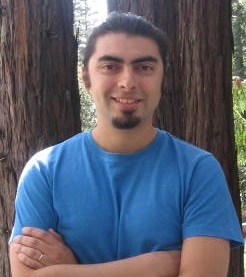An ex-student of DAS will make studies with Hubble
Friday, August 29, 2014

The intergalactic medium is the space between galaxies. While it might seem empty at first glance, it has in fact a network of small and large filaments that intersect to form a structure. Until recently, this was just speculation. However, we now know that this space which does not emit light contains matter, and a lot of it, which is only observable through the study of its ultraviolet radiation.
NASA's Hubble Space Telescope is the only instrument able to detect this material, without being affected by atmospheric conditions, a serious handicap for ultraviolet observations with ground-based telescopes.
This is one of the reasons why this is the telescope with greater scientific demand. It is hence not easy for an astronomer to manage to use it. A committee of experts decides which scientists will have this privilege, and the allocated amount of time.
At the end of the last call to use Hubble, this committee had received 1,135 proposals for observing time, of which only 267 were accepted. Of these, three selected projects are from chilean astronomer Nicolas Tejos, postdoctoral fellow in the University of California at Santa Cruz (USA), to study the intergalactic medium.
Tejos explains that the goal of their research is to test the models of structure formation of the Universe. They are focused on the intergalactic medium in (1) 'galaxy voids', (2) cosmological filaments and (3) clusters of galaxies. "The three proposals cover various mediums. They are independent of each other. The physical properties are different and we want to test if it is affecting the intergalactic medium", he says.
"Seeing a galaxy is relatively easy, but the intergalactic medium does not emit its own light, we need a tool capable of separating the light," says the astronomer, who will work with three teams, two of which also involve Chilean researchers, including the professor Sebastián López from the Department of Astronomy (DAS) at the University of Chile, with whom he obtained his Master's degree.




